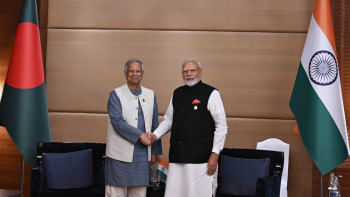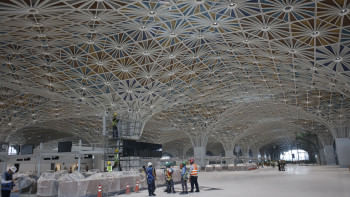Bangladesh must diversify its trade infrastructure after India's ban

Just recently, India revoked a key transhipment facility that allowed Bangladesh to export goods to third countries via Indian borders. This is a fresh blow to Dhaka at a time when it is already potentially facing steep US tariffs on its exports, although that story is still unfolding.
In a circular, India's customs department announced the withdrawal of a 2020 provision that had permitted the movement of Bangladeshi goods through Indian customs stations to ports and airports using containers or closed-body trucks.
Citing rising delays and logistical costs that were reportedly hampering India's own exports and creating congestion, the Indian Ministry of External Affairs defended the move as a necessity. However, the timing of the move, with so many Asian countries facing major trading challenges, is unfortunate, to say the least.
The revocation is expected to disrupt trade flows to neighbouring countries such as Nepal, Bhutan, and Myanmar. These are routes on which Bangladeshi exporters have increasingly relied for accessing regional markets.
Bangladesh's garment industry, the largest contributor to our export economy, typically prioritises direct sea routes to key Western markets. However, the development curtails opportunities for regional integration and logistics flexibility. While the direct impact on garments may be limited, the decision nonetheless restricts regional trade potential. India remains a major trading partner for Bangladesh, and the decision signals a troubling shift in bilateral relations.
These developments have unfolded against a backdrop of political instability in Bangladesh, where ousted Prime Minister Sheikh Hasina sought temporary refuge in India following mass protests last year. The context may further complicate an already tense diplomatic environment.
What this decision ultimately means for Bangladesh's ready-made garment (RMG) industry is not so much a direct disruption to our largest export channels, but a broader signal of geopolitical vulnerability and logistical fragility.
The RMG sector, which accounts for the vast majority of Bangladesh's foreign earnings, thrives on the predictability of access. This includes access to raw materials, ports, stable shipping routes, and markets. The removal of India's transhipment privilege undercuts one such access point, even if it is not the most critical. It introduces an element of uncertainty and reinforces the importance of transport diversification at a time when our country is being buffeted by rising global protectionism.
While most Bangladeshi garments are exported directly to the US and Europe by sea, land-based transhipment through India has been important for accessing niche markets in South Asia. For smaller and medium-sized exporters, particularly those serving Nepal and Bhutan, the now-closed facility offered a cost-effective and faster alternative to more circuitous sea and air routes. The loss of this infrastructure introduces delays, reroutes shipments, and adds financial pressure, especially on firms already operating on tight margins in a highly competitive industry.
The move also reflects an erosion of the regional trade optimism that had accompanied past agreements. For Bangladesh, whose growth increasingly depends on diversifying markets and building intra-Asian supply chains, India's decision is not just an operational hindrance; it is also a strategic setback. The promise of a more connected South Asia, where goods could flow seamlessly across borders and regional markets could develop complementary strengths, now seems further away. This is particularly frustrating for Dhaka, which has worked toward liberalising trade relations in recent years, positioning itself as a bridge between South and Southeast Asia.
In light of these changes, Bangladesh must rethink its diplomatic and industrial strategies. We can no longer afford to rely heavily on a small group of export markets and limited transit agreements. There is now an urgent need to deepen relations with alternative trade partners, particularly in Southeast Asia, the Middle East, and Africa. At the same time, we must invest more heavily in domestic port infrastructure and explore regional maritime routes to bypass dependency on Indian land.
The garment industry, for its part, will need to future-proof its operations by embracing resilience across multiple dimensions. This includes strengthening supply chain management to accommodate unexpected transit disruptions, enhancing factory compliance to attract new buyers under stricter sourcing standards, and adopting digital tools to gain real-time visibility into logistics networks. Garment manufacturers may also consider vertical integration or collaboration with regional partners to offset the higher costs imposed by disrupted trade corridors and protectionist tariffs.
The move by India serves as a wake-up call. The interconnectedness of geopolitics and trade logistics is becoming more pronounced, and Bangladesh's RMG sector sits squarely at the crossroads. To navigate the new terrain, we must move swiftly and decisively to position Bangladesh not just as a low-cost supplier but as a smart, adaptable, and strategic partner in global value chains.
Mostafiz Uddin is the managing director of Denim Expert Limited. He is also the founder and CEO of Bangladesh Denim Expo and Bangladesh Apparel Exchange (BAE).
Views expressed in this article are the author's own.
Follow The Daily Star Opinion on Facebook for the latest opinions, commentaries, and analyses by experts and professionals. To contribute your article or letter to The Daily Star Opinion, see our submission guidelines.

 For all latest news, follow The Daily Star's Google News channel.
For all latest news, follow The Daily Star's Google News channel. 






Comments